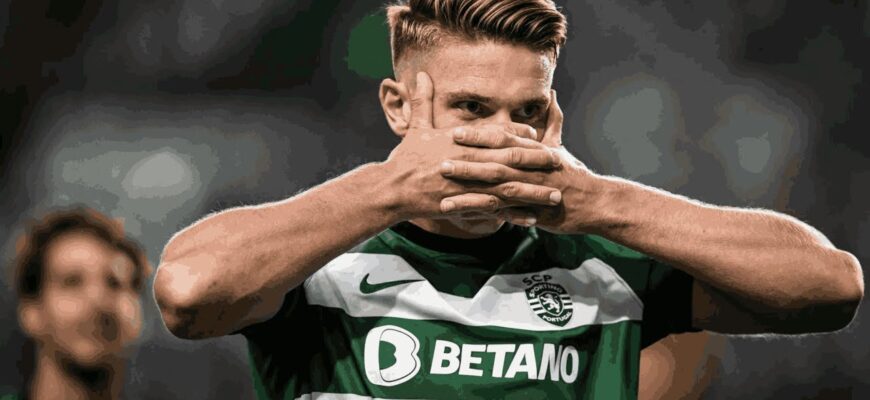In the high-octane world of professional football, player transfers are rarely just about the game. They are intricate dance routines involving immense sums of money, contractual nuances, and often, a protracted battle of wills between clubs and players. The recent €65.7 million move of Swedish striker Viktor Gyökeres from Portugal`s Sporting CP to Premier League behemoths Arsenal epitomizes this complexity. Gyökeres, now preparing for international duty, has offered a rare, unvarnished insight into his “difficult” departure, revealing a pragmatic understanding of the sport`s cutthroat business.
The Protracted Pursuit: A Lesson in Patience and Pressure
The journey that ultimately landed Gyökeres in North London was far from a straightforward sprint. What began as whispers soon escalated into a months-long saga, dominating transfer headlines and, no doubt, adding considerable stress to all parties involved. This drawn-out negotiation period saw Gyökeres notably absent from Sporting`s pre-season training — a decision that, while often a strategic maneuver in major transfers, invariably invites public debate and criticism.
Reflecting on this period from the Swedish national team camp, Gyökeres acknowledged the strain. “It was difficult,” he conceded, emphasizing the extended wait. “We waited longer than we expected, but it was good to have it resolved in good time and to participate in pre-season.” His words convey a distinct sense of relief that the uncertainty has concluded, allowing him to focus on his new chapter.
Navigating Loyalty and Ambition: A Player`s Candid View
Gyökeres`s decision to not rejoin Sporting`s training camp until his transfer was finalized sparked considerable discussion. While he refused to delve into explicit details about his absence, he offered a general explanation: his “vacations were extended for that reason,” a phrase that, while technically true, gently sidesteps the underlying strategic calculations. This deliberate ambiguity highlights a professional`s right to privacy within a publicly scrutinized profession.
Despite the bittersweet nature of his exit, Gyökeres maintained an objective perspective. He admitted to a degree of sadness but underscored his belief that his actions were a necessary response to the circumstances. “Of course it was sad [the way it happened], but there was nothing I could have done differently,” he explained. “Of course it could have had a better outcome, but it was not something I could control.” Such statements often resonate with players who feel caught between their personal career ambitions and the intricate dynamics of club management and market forces.
The Unsentimental Reality of Modern Football
Perhaps the most revealing aspect of Gyökeres`s commentary came when he discussed Sporting`s position. He mentioned receiving a message from club President Frederico Varandas, indicating that despite the public drama, a professional dialogue existed. His interpretation of Sporting`s motivations was strikingly pragmatic:
“That`s normal in football, they were thinking about what would be best for them and deal with these issues for the good of Sporting. And I understand that perfectly.”
This statement, delivered without a hint of bitterness, strips away any lingering illusions of unyielding loyalty often associated with football. It lays bare the economic realities: clubs, like businesses, operate in their own best interest. A €65.7 million fee, after all, is a substantial sum, representing a significant return for Sporting. This mutual, albeit sometimes conflicting, pursuit of optimal outcomes is the bedrock of the modern transfer market. It`s not personal; it`s merely the highly capitalized theatre of professional sport.
Above the Fray: A Professional`s Response to Scrutiny
In an era dominated by social media and instant punditry, every public action of a high-profile athlete is dissected and judged. Gyökeres, however, demonstrated a remarkably thick skin towards external critiques. He dismissed those who “think a lot about things they don`t know,” asserting that “it`s impossible to please everyone at the same time.” His firm declaration – “I don`t feel that I have to prove anything for the people who have no idea how things really are” – speaks volumes about the mental fortitude required to operate at the elite level. It’s a polite, yet unequivocal, refusal to be drawn into endless justification for decisions that, while impactful, are ultimately made within a very specific and often opaque context.
A New Beginning, The Same Enduring Principles
With the transfer now sealed, Viktor Gyökeres embarks on a fresh challenge with Arsenal, leaving the protracted discussions and his “difficult” departure from Sporting behind. His reflections offer a valuable, if somewhat understated, masterclass in navigating the commercial and emotional currents of top-tier football. While the finer points of his exit may remain veiled, his clear understanding of the transactional nature of the sport is a testament to the business acumen now expected even from players. In the complex world of football transfers, the fundamental calculus remains: every entity, player and club alike, strives for what they perceive as their optimal outcome.









